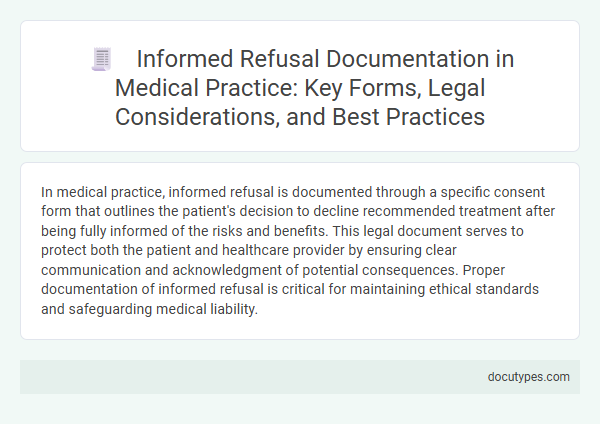In medical practice, informed refusal is documented through a specific consent form that outlines the patient's decision to decline recommended treatment after being fully informed of the risks and benefits. This legal document serves to protect both the patient and healthcare provider by ensuring clear communication and acknowledgment of potential consequences. Proper documentation of informed refusal is critical for maintaining ethical standards and safeguarding medical liability.
Introduction to Informed Refusal in Medical Practice
In medical practice, informed refusal occurs when a patient declines a recommended treatment or procedure after understanding its risks and benefits. Documenting this refusal is crucial for legal protection and ensuring clear communication between healthcare providers and patients.
The primary document used to record informed refusal is the informed refusal form. This form outlines the information given to the patient, the patient's decision, and the potential consequences of refusing treatment. Your signed acknowledgment on this document helps safeguard your rights and supports shared decision-making in healthcare.
Defining Informed Refusal: Legal and Ethical Foundations
Informed refusal is a patient's right to decline medical treatment after understanding the associated risks and benefits. Legal and ethical foundations ensure your autonomy is respected within healthcare decisions.
- Informed Refusal Document - A formal record detailing a patient's decision to refuse specific medical interventions.
- Legal Requirements - Laws mandate documentation of informed refusal to protect both patient rights and healthcare providers.
- Ethical Principles - Healthcare professionals must provide clear information to enable patients to make voluntary, informed refusals.
Proper documentation of informed refusal safeguards your rights and supports ethical medical practice.
Importance of Documenting Patient Refusals
Documenting informed refusal in medical practice is essential for protecting patient autonomy and ensuring legal compliance. Accurate records provide clear evidence of the patient's decision to decline treatment after being fully informed of the risks and benefits.
- Informed Refusal Form - A specific document signed by the patient confirming their decision to refuse recommended medical treatment.
- Medical Records - Detailed notes by healthcare providers describing the discussion, patient understanding, and refusal of treatment.
- Consent Documentation - Records that contrast accepted consents with refusals, showing thorough communication and patient choices.
Essential Elements of Informed Refusal Forms
Which document records informed refusal in medical practice? The informed refusal form is the primary document used to record a patient's decision to decline medical treatment after being fully informed of the risks and benefits. Essential elements include patient identification, a clear description of the recommended treatment, and the patient's acknowledgment of understanding potential consequences.
Legal Implications of Informed Refusal Documentation
In medical practice, informed refusal is documented through a specific form known as the Informed Refusal Document or Refusal of Treatment Form. This document records the patient's decision to decline recommended medical interventions after being fully informed of the risks and benefits. Proper documentation of informed refusal carries significant legal implications, protecting healthcare providers from liability by proving that the patient was educated and voluntarily chose to refuse treatment.
Best Practices for Healthcare Providers
In medical practice, documenting informed refusal is critical for patient safety and legal protection. The refusal must be recorded clearly in the patient's medical record to ensure transparency and accountability.
- Informed Refusal Form - A dedicated document signed by the patient indicating they understand and decline the proposed treatment or procedure.
- Progress Notes - Detailed entries by healthcare providers describing the patient's refusal, reasons given, and any counseling provided.
- Consent Documentation Section - Part of the medical record designed to capture both consent and refusal statuses with time-stamped signatures and notes.
Common Challenges in Documenting Refusals
In medical practice, informed refusal is typically documented in the patient's medical record, such as progress notes or a specific refusal form. Common challenges in documenting refusals include ensuring clear communication, accurately reflecting the patient's understanding, and obtaining proper signatures. You must maintain thorough and precise records to protect both patient rights and medical liability.
Role of Communication in Informed Refusal
Informed refusal in medical practice is primarily documented through a signed informed refusal form, which records the patient's decision to decline recommended treatment after being fully informed of the risks and benefits. This document serves as a legal safeguard for healthcare providers, ensuring clear communication and acknowledgment of the patient's autonomy.
Effective communication plays a critical role in the process of informed refusal by facilitating understanding between patient and provider about the consequences of declining treatment. Thorough dialogue and documentation of this exchange help to uphold ethical standards and support patient-centered care in medical practice.
Case Studies: Informed Refusal Documentation in Action
In medical practice, informed refusal is documented primarily through the use of consent forms explicitly designed to record a patient's decision to decline recommended treatment or procedures. Case studies reveal that detailed notes in the patient's medical record also serve as crucial evidence of informed refusal.
One notable case involved a patient who refused surgery, where the physician documented the discussion extensively in the medical records and obtained a signed refusal form. These documents protect both the patient's autonomy and the healthcare provider's legal standing by clearly outlining the risks and consequences communicated during the refusal process.
Which Document Records Informed Refusal in Medical Practice? Infographic

